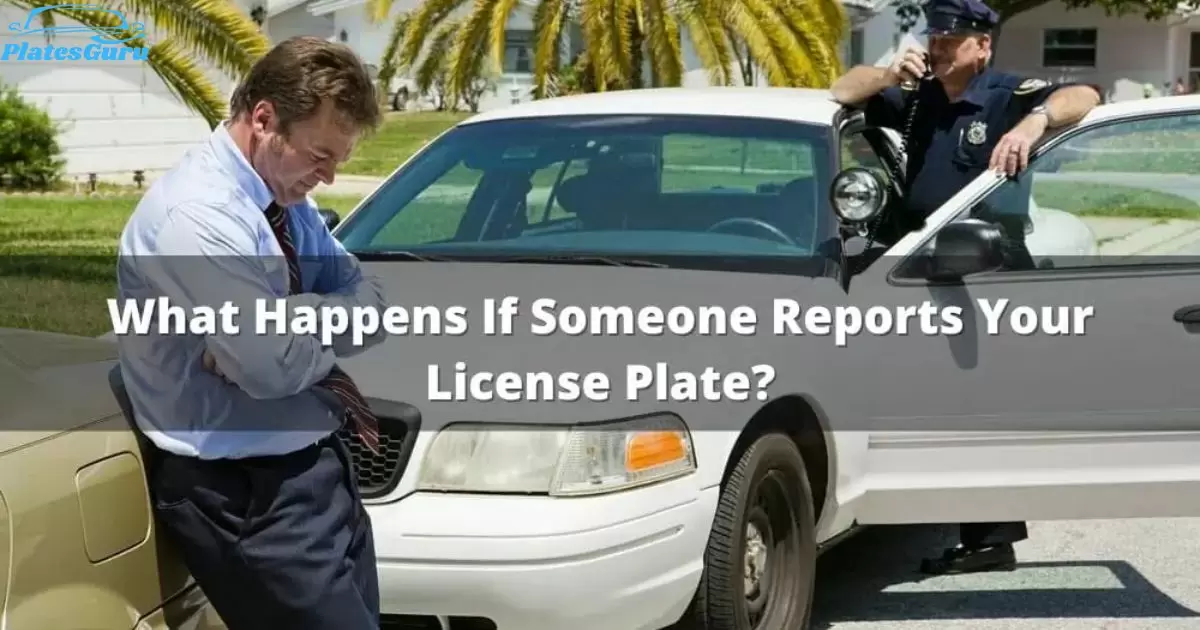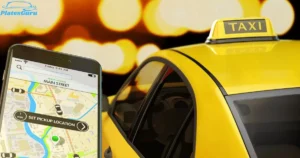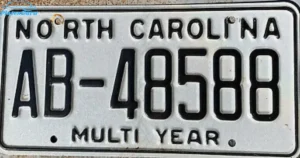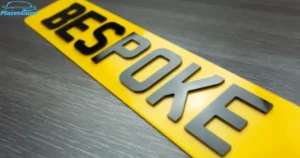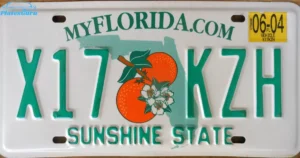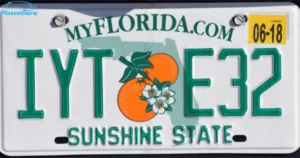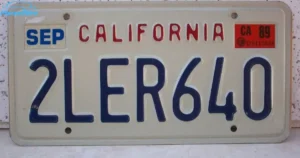A license plate is a special tag made of metal or plastic that’s attached to your car, showing a unique mix of letters and numbers given by the government. It helps identify your car for things like registration, taxes, and keeping an eye on it for legal reasons.
Have you ever considered what would happen if someone reported your license plate? Picture this: you’re just driving around town, and suddenly, you’re caught up in something you didn’t expect. Let’s dive into what it really means when your license plate gets reported and how you can keep yourself worry-free while driving. It’s important to know these things to protect yourself.
If your license plate gets reported, the police might look into it to see if there were any rules broken or if something fishy was going on. What happens next could range from a simple warning to a fine, or even more serious legal issues. It’s crucial to follow all the driving and legal rules to steer clear of these problems.
What happens if someone tells the police about your license plate?
When someone reports your license plate to the police, they pass on your car’s details to law enforcement. This could be because they saw your car in a traffic incident, accident, or just have a hunch that something’s not right. Here’s what could unfold next:
Investigation:
The police will usually check out the report. If it’s about an accident or traffic violation, they might reach out to you to learn more and understand what happened.
Traffic Offenses:
If the report is about a traffic incident, you might receive a ticket or fine in the mail. You might have to deal with this in court and face fines or other penalties.
Accidents:
If the report involves a car crash, police will likely look into it to figure out who’s at fault and if any legal action is needed. They’ll talk to people involved and any witnesses to get the full picture.
Suspicious Activity:
Reports of suspicious or illegal behavior get taken seriously. Depending on the situation, police might ask you to check your car or take other steps as part of their investigation.
Stolen Vehicle:
If your license plate is reported stolen, police will use that info to find your car. They’ll also let other law enforcement know so they can keep an eye out.
Parking Violations:
You might get a warning or a ticket if you’re caught breaking parking rules or leaving vehicles unattended.
Read more post: How Can I Get A Black California License Plate?
Why People Report License Plates
People report license plates for different reasons, all with a purpose.
Environmental Violations:
Reporting cars that pollute too much or break environmental laws, like having smoky exhaust or dumping illegally.
Noise Complaints:
Reporting loud music or super noisy exhausts that disturb the peace.
Stalking or Harassment:
If someone feels like they’re being followed or harassed by a car, they’ll report the license plate.
Fraud Investigations:
Notifying authorities about license plates linked to fraud, like identity theft or scams.
Child Safety Concerns:
Reporting when a child is left alone in a car, especially in bad weather, for safety reasons.
Vandalism:
Reporting plates connected to criminal acts like vandalism or property damage.
Reckless Driving:
Reporting dangerous driving incidents, like sudden turns or road rage.
Illegal Transport:
Reporting cars suspected of carrying illegal stuff helps law enforcement.
Public Health Violations:
Reporting cars involved in actions that risk public health, like dumping hazardous chemicals.
How To Look Up If Someone Reported Your License Plate
Depending on why your license plate was reported, there could be various outcomes in store for you. For instance, if it’s reported due to an accident, you might receive a ticket or citation, which could lead to fines or even a court appearance.
In cases of reported auto accidents, insurance companies and authorities might launch investigations, affecting your insurance costs. Reports of suspicious activities trigger thorough investigations by law enforcement, often requiring your cooperation.
If your vehicle is reported stolen, authorities will actively search for it using your license plate information. You receive warnings or tickets for parking violations or leaving vehicles unattended. To address the issue effectively and avoid potential legal repercussions, it’s crucial to take any report seriously and collaborate with the authorities.
Understanding The Reporting Process
The process of reporting a stolen license plate varies by state but generally includes several key steps. You must complete and submit a plate-replacement application to your Department of Motor Vehicles (DMV). If your state requires it, you should also submit a police report alongside your application. It’s important to surrender any remaining or damaged license plates to the DMV and, if necessary, provide proof of address and/or identity.
You will need to pay for your replacement plates. In some states, like California, you are required to report the theft to the police first, as the DMV will need the police report at the time of your replacement application. This ensures your plates are on record as stolen, which could help in apprehending the thieves if the plates are spotted and keeps you clear of any traffic violations committed with your plates.
The legal framework, such as Georgia’s, mandates that law enforcement immediately reports the theft or loss of a motor vehicle or license plate to the Georgia Crime Information Center upon receiving reliable information. This includes the recovery of any stolen or lost vehicle or plate. The reporting agency must notify the vehicle’s owner or their successor within 72 hours of the vehicle’s recovery. Failure to comply with these regulations can result in significant repercussions for law enforcement officers.
Legal Implications For Reporting License Plates
When someone reports your license plate, the police will initiate an investigation based on the nature of the report. The outcome could range from your license plate being flagged for future stops by traffic patrol, to police contacting you or even visiting your home. It’s important to seek legal counsel if contacted by the police for questioning, as the reasons for reporting a license plate can vary from traffic violations like speeding or reckless driving to more serious allegations.
Automatic License Plate Readers (ALPRs) are increasingly used by law enforcement to scan license plates of passing vehicles. These devices capture not only the license plate number but also the time, date, and GPS coordinates of each scan, which can be used to track the movement of vehicles. ALPRs can compare scanned plates against “hot lists” of stolen vehicles or vehicles associated with AMBER Alerts, and the data collected can be retained for future use, sometimes indefinitely. The widespread use of ALPRs raises privacy concerns, as they have the capability to plot a vehicle’s location over time, analyze travel patterns, and even predict future locations.
Privacy Concerns And License Plate Reporting
Privacy concerns related to license plate reporting and the use of Automatic License Plate Readers (ALPRs) are significant. The indiscriminate scanning of license plates by ALPRs captures not just the license plate number but also detailed location data of vehicles at specific times. This data collection raises questions about the extent to which individuals’ movements are tracked without their consent or knowledge.
One of the primary privacy issues is the potential for creating detailed profiles of individuals’ movements and habits based on the collected data. ALPRs can record a vehicle’s presence at sensitive locations, such as religious institutions, political protests, or healthcare providers, which could be used to infer personal details about an individual’s life and preferences. The retention of this data, sometimes indefinitely, exacerbates these concerns, as it allows for the possibility of long-term surveillance and tracking of individuals without their consent.
Another concern is the lack of transparency and regulation around the use and sharing of ALPR data. Law enforcement agencies and other entities can share this data with little oversight, potentially exposing individuals to unwarranted surveillance by government entities or even private actors. The data collected by ALPRs can be accessed by various agencies and, in some cases, by private companies, raising questions about who has access to this information and how it is used.
What Happens If Someone Gets Your License Plate Number
If someone gets your license plate number, it could be for several reasons like reporting a traffic violation, an accident, or suspicious activity. Authorities might investigate if the report is serious. However, without more context or evidence, having just your plate number doesn’t typically lead to immediate consequences. Privacy laws protect your information, so personal details aren’t easily accessible just from the plate number.
Potential Consequences For Reported Plates
If your license plate gets reported, different outcomes could follow depending on the reason. For example, if it’s linked to an accident, you might receive a ticket or citation, leading to fines or a court appearance.
Following a reported auto accident, insurance companies and authorities may launch investigations, impacting insurance costs. Reports of suspicious activities prompt thorough investigations by law enforcement, requiring your cooperation.
If your vehicle is reported stolen, authorities will actively search for it using your license plate info. You might also face warnings or tickets for parking violations or abandoning vehicles.
To address the issue effectively and prevent potential legal troubles, it’s crucial to take any report seriously and cooperate with authorities.
Law Enforcement Response To Reported Plates
When someone reports your license plate, the police will initiate an investigation based on the nature of the report. The outcome could range from your license plate being flagged for future stops by traffic patrol, to police contacting you or even visiting your home.
It’s important to seek legal counsel if contacted by the police for questioning, as the reasons for reporting a license plate can vary from traffic violations like speeding or reckless driving to more serious allegations. Automatic License Plate Readers (ALPRs) are increasingly used by law enforcement to scan license plates of passing vehicles.
These devices capture not only the license plate number but also the time, date, and GPS coordinates of each scan, which can be used to track the movement of vehicles. ALPRs can compare scanned plates against “hot lists” of stolen vehicles or vehicles associated with AMBER Alerts, and the data collected can be retained for future use, sometimes indefinitely. The widespread use of ALPRs raises privacy concerns, as they have the capability to plot a vehicle’s location over time, analyze travel patterns, and even predict future locations.
Uncover the Facts: Someone Snapped a Photo of My License Plate
Traffic Violations:
If your license plate gets reported for a traffic violation someone witnessed, you might hear from law enforcement or receive a ticket. This could lead to court appearances, fines, or both.
Accidents:
If your license plate comes up in connection with a car accident, insurance companies and possibly the police will investigate. You may need to cooperate with their inquiries and provide information.
Suspicious Activity:
If your license plate is reported due to suspicious or unlawful behavior, police may launch a broader investigation. Depending on the situation, this could involve questioning you, searching your vehicle, or taking further actions.
Stolen Vehicle:
If your license plate is reported stolen, law enforcement will use this info to track down your car aggressively. They’ll also alert other agencies to be on the lookout.
Parking Violations:
Reports may also involve illegal parking or abandoned vehicles. You could receive warnings or citations for parking issues in these cases.
Investigation Procedures For Reported License Plates
When a license plate is reported, the law enforcement response can vary depending on the nature of the report. The police may investigate the situation based on the report’s severity, which could result in the license plate being flagged. In some cases, this could lead to the driver being stopped by traffic patrol, contacted by the police, or even visited at their home.
The consequences of having your license plate reported can range from receiving a warning to more severe actions such as losing your driver’s license, being fined, or even facing jail time for serious offenses like hit-and-run incidents or reckless driving. For those curious about whether their license plate has been reported, there isn’t a straightforward way to find out directly. How to run a license plate for free.
You can look for any recent parking tickets or citations, check with your local DMV or police department for any reports or complaints filed against your license plate, and stay alert for any unusual activity around your car. If involved in a hit-and-run, it’s important to stop and exchange information, as leaving the scene can result in criminal charges. Law enforcement agencies can use your license plate number to initiate an investigation or insurance claim if necessary.
False Reports And Their Consequences
Filing false reports, including those related to license plates or any incident, carries significant legal consequences and is treated seriously by law enforcement. Typically, filing a false report is considered a misdemeanor offense.
The severity of the charge can escalate based on the circumstances surrounding the false report, such as the involvement of significant police resources, injury to another person, or property damage. In these cases, charges could rise to the felony level, which might result in a year or more in prison.
The act of filing a false police report is not protected by the First Amendment and is viewed as a crime against the justice system itself. It misleads law enforcement and diverts resources away from actual crimes, potentially leaving the community vulnerable.
Depending on state laws, penalties for filing a false police report can include jail time, fines, and community service. For instance, under California Penal Code Section 148.5, consequences can go up to six months in county jail, along with fines and possible probation terms that might include counseling or community service.
The Consequences Of Getting Your License Plate Reported
If your license plate is reported, law enforcement may investigate for involvement in illegal activities or traffic violations. Consequences can include losing your license, paying fines, or even jail time for serious offenses. It’s important to respond to any summons, gather evidence of your innocence, and consider legal counsel if necessary. To avoid getting reported, obey all traffic laws, practice defensive driving, avoid road rage, and do not drive recklessly.
Can You Report A License Plate For Reckless Driving
Yes, you can report a license plate for reckless driving. When you witness such behavior, it’s important to gather as much information as possible about the vehicle and the incident, including the license plate number, car make and model, and the location. You should then call the police, providing them with a detailed description of what you observed.
After reporting, you can follow up with the police department to check on the progress of the investigation. Depending on the severity of the offense, the reported driver may receive a warning, a citation, or even face arrest for more serious offenses like driving under the influence. Reporting a reckless driver can contribute to road safety and potentially prevent accidents.
Impact On Vehicle Owners And Drivers
About 38% of Americans consider buying an electric vehicle (EV) for their next purchase, driven by environmental concerns and fuel savings. However, the public is divided on phasing out gas-powered vehicles by 2035, with 59% opposed. The main barriers to EV adoption include the availability and reliability of public charging infrastructure. Confidence in building necessary EV infrastructure is low, with only 17% of Americans very or extremely confident in its development.
Technology And License Plate Tracking
License plate tracking technology, such as Automatic License Plate Recognition (ALPR) systems, uses cameras and computer algorithms to read and store license plate numbers. This technology helps in various law enforcement activities including tracking stolen vehicles, identifying vehicles associated with crimes, and managing traffic.
It raises privacy concerns due to the potential for tracking individuals’ movements without their consent. The balance between public safety benefits and privacy rights remains a key issue in the deployment and use of this technology.
If Someone Takes A Picture Of Your License Plate What Can They Do
Is it against the law to photograph license plates?
Generally speaking, taking pictures of license plates that are visible in public is not illegal. License plates are meant to be seen in public spaces and are often photographed for various legitimate purposes. Here are some key points to consider:
Public Display:
License plates are designed to be displayed on the front and back of vehicles in public areas, making them easily accessible to anyone in public places.
Common Reasons:
People often take photos of license plates to document accidents, report reckless driving, capture unique or personalized plates, or share on social media.
Privacy Limitations:
While photographing license plates in public is generally acceptable, there are limits on how the information can be used. It’s not permissible to use personal information obtained from license plates for malicious purposes like harassment or identity theft.
Local Regulations:
Local laws may vary, so it’s important to check if there are any restrictions on photographing license plates in your area.
Safety Considerations:
If you believe someone is taking photos of your license plate with harmful intent or if you feel your privacy or safety is being compromised, it’s advisable to contact local law enforcement. They can assess the situation and take appropriate action if necessary.
Data Protection In License Plate Reporting
| Aspect | Description |
| User Privacy | Your privacy is a top priority. License plate reporting systems are designed to keep your identity anonymous, so you can report without worry. |
| Data Encryption | Your information is like a secret code, encrypted for secure sending. This ensures that it stays safe while being transmitted. |
| Limited Access | Only the right people get to peek at reported data. Authorized personnel are the gatekeepers, ensuring your info is seen only by those who need to. |
| Data Retention Policies | We’ve got clear rules on how long your data hangs around. Once it’s served its purpose, it’s outta here, keeping things tidy and minimizing risks. |
| Consent Mechanisms | Before anything goes down, you’re asked for the green light. Your consent matters, and we make sure you’re fully in the know before anything happens with your info. |
| Security Measures | Fort Knox ain’t got nothing on us! We’ve got super-strong security measures in place to lock down your data and keep the bad guys out. |
| Anonymization Techniques | We’re like the James Bond of data protection, using special techniques to strip your info of any identifying details, so it’s as safe as can be. |
| Compliance with Regulations | We play by the rules, always. Our systems are fully compliant with all the data protection laws and regulations, ensuring that your privacy is always respected and safeguarded. |
Could you receive a ticket if someone reports your license plate?
Yes, if someone reports your license plate for a driving violation, you could indeed end up with a ticket or citation. When a witness reports your license plate to the police, they typically provide details about the offense they observed, such as speeding or running a red light.
Law enforcement then uses this information to identify the registered owner of the vehicle, which may lead to you receiving a ticket either by mail or in person. The ticket usually outlines the alleged violation, the associated fine, and instructions on how to contest it if you believe it’s incorrect.
Is there a way to safeguard my identity or privacy if my license plate is photographed?
Here are some steps you can take to protect your identity and privacy if someone snaps a picture of your license plate:
- Refrain from posting images of your car with the license plate online.
- Regularly monitor your credit reports for any unauthorized activity.
- Notify the police if your license plate is linked to any criminal activities.
- Explore the availability of privacy license plates in your area, which can partially obscure your plate numbers.
- Whenever possible, park your vehicle in secure and well-lit areas.
Is it legal for someone to photograph my license plate in public?
Generally, yes. When your car is parked in a public area, it’s usually permissible for someone to take a photo of your license plate. License plates are considered publicly available information, and there are typically legitimate reasons for photographing them.
Common reasons include documenting accidents, reporting unsafe driving, or capturing unique or customized plates. However, it’s essential to be aware that local laws regarding photography may vary, so it’s advisable to check your jurisdiction’s regulations.
While photographing license plates is generally acceptable, privacy concerns may arise if the images are used improperly or if there are suspicious motives behind the photography. In such cases, seeking guidance from local authorities is necessary.
Frequently Asked Question
What Happens If You Don’t Return License Plates Florida?
If you don’t return license plates in Florida, you may face fines or penalties.
How Do I Report A Stolen License Plate In Florida?
To report a stolen license plate in Florida, contact local police or visit a law enforcement agency.
Which State Has The Most License Plate Options?
Florida has the most license plate options in the US.
How Much Is The Most Expensive License Plate?
The most expensive license plate’s cost can vary significantly depending on factors like customization and rarity.
Conclusion
License plate reporting systems prioritize user privacy by anonymizing data and implementing robust security measures. Data encryption ensures secure transmission, while limited access and clear data retention policies minimize risks. Consent mechanisms ensure user awareness and compliance with regulations, while anonymization techniques protect identity. If reported, potential outcomes range from traffic infractions to investigations, emphasizing the importance of cooperation with authorities. While legal, photographing license plates raises privacy concerns, highlighting the need for transparency and adherence to local regulations.
